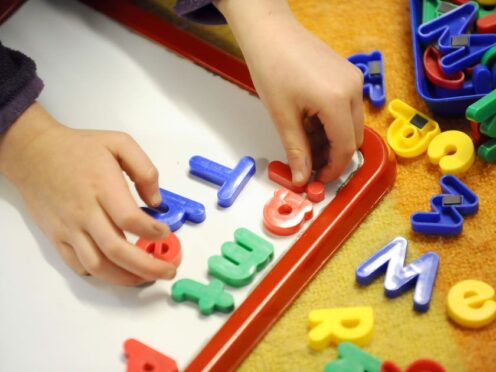
Chancellor Jeremy Hunt has said he is confident the free childcare expansion pledge he made at the last Budget is “on track”.
But the senior Tory refused to give a guarantee that the first stage of the rollout – which will give working parents of two-year-olds 15 free hours – will be for delivery next month.
It comes after Labour said it had compiled a dossier that indicates more than 180,000 childcare places across England could be at risk due to over 3,000 nursery closures.
Shadow education secretary Bridget Phillipson said her party’s findings leave the Conservatives’ childcare promise “in absolute tatters”.
The Chancellor announced at the Budget last year that eligible families of children as young as nine months will be able to claim 30 hours of free childcare a week by 2025.
The announcement in March 2023 was seen as an attempt to pre-empt Labour, with Ms Phillipson known to have been working on an expanded childcare offer for the Opposition’s election manifesto.
As part of a staggered rollout of the policy, working parents of two-year-olds will be able to access 15 hours of free childcare from April.
This will be extended to working parents of all children older than nine months from September before the full rollout a year later.

According to a survey published last month by National Day Nurseries Association, 54% of private, voluntary and independent nursery owners were unlikely to offer any additional places to two-year-olds or were still not sure if they could.
More than 55% said they could not meet local demand for places, meaning eligible families may miss out on the offer.
Mr Hunt told the BBC’s Sunday With Laura Kuenssberg programme that he believed the Government was “on track” with the “huge change” being offered in childcare provision.
“It may mean that we need to employ 40,000 more people in the sector and that is why we are bringing it in stages,” he said.
Pressed if he could give a guarantee that the first step would be ready in time for next month, the Cabinet minister said: “You will understand why I don’t want to give an absolute guarantee.

“But am I confident that we are delivering this programme and it will be on track for this April? Yes, I am.”
Ms Phillipson, speaking on the same programme, said the Chancellor appeared to “not like his own policy” on free childcare expansion.
She said: “What we heard from Jeremy Hunt is a failure to guarantee that parents will be able to access what he promised a year ago.
“A year ago I was pushing Jeremy Hunt really hard on childcare, he rushed out this commitment with a pledge with no plan to make it happen, and now it is working parents – who in the weeks and months ahead, when they go and try and access those places that have been promised – will discover that they just can’t be delivered in the way that he set out.
“What was also rather peculiar, I thought, about what he went on to say, he seemed to almost not like his own policy and regarded it as some kind of extension of the welfare state.”

Enjoy the convenience of having The Sunday Post delivered as a digital ePaper straight to your smartphone, tablet or computer.
Subscribe for only £5.49 a month and enjoy all the benefits of the printed paper as a digital replica.
Subscribe